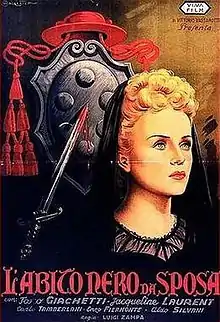| L'abito nero da sposa | |
|---|---|
 Film poster | |
| Directed by | Luigi Zampa |
| Screenplay by | |
| Based on | The Cardinal by Louis N. Parker |
| Produced by | Vittorio Vassarotti[1] |
| Starring | |
| Cinematography | |
| Edited by | Maria Rosada[1] |
| Music by | Carlo Piero Giorgi[1] |
Production company | Vi-Va Film[1] |
| Distributed by | Produttori Associatti |
Release date |
|
Running time | 96 minutes[1] |
| Country | Italy[1] |
L'abito nero da sposa (transl. The Black Wedding Dress) is a 1945 Italian historical drama film directed by Luigi Zampa and starring Fosco Giachetti.[1][2] It is based on the play The Cardinal by Louis N. Parker.
Cast
- Fosco Giachetti as Il cardinale Giovanni de Medici
- Jacqueline Laurent as Berta Chigi
- Enzo Fiermonte as Giuliano de Medici
- Carlo Tamberlani as Andrea Strozzi
- Aldo Silvani as Bartolomeo Chigi
- Domenico Viglione Borghese as Il governatore Baglioni
- Manoel Roero as Raffaello (as Manuel Roero)
- Fausto Guerzoni as Beppe, il campanaro
- Evelina Paoli as Madonna de Medici
- Peppino Spadaro as Luigi
- Renato Chiantoni as Bernardino
- Emilio Petacci as Un mercante della statua di Venere
- Franco Pesce as Un invitato alla festa
Production
L'abito nero da sposa is based on the play The Cardinal by Louis N. Parker.[1] The film had some notoriety in Italy as it was blacklisted by the church.[2] The film was originally going to be the directorial debut of Mario Pannunzio, who dropped out of the project.[2] Luigi Zampa, who was in the army and about to leave to the Russian front, was given a 60 day permit to direct the film.[2] During principal shooting on the film, on September 8, 1943 General Pietro Badoglio signed an armistice and joined the allies as co-belligerent.[2] Film was put on hold until the American forces were in Italy, and filming continued in June 1944.[2]
Release
L'abito nero da sposa was distributed by Produttori Associatti in Italy on May 17, 1945.[1] Zampa later spoke on about his early films, stating that he "prefer not to remember [them]. They taught me how to move the camera and direct the actors. But I never tried to watch them again, there is nothing inside them. They were just spectacles."[2]
References
Bibliography
- Curti, Roberto (2017). Riccardo Freda: The Life and Works of a Born Filmmaker. McFarland. ISBN 978-1476628387.